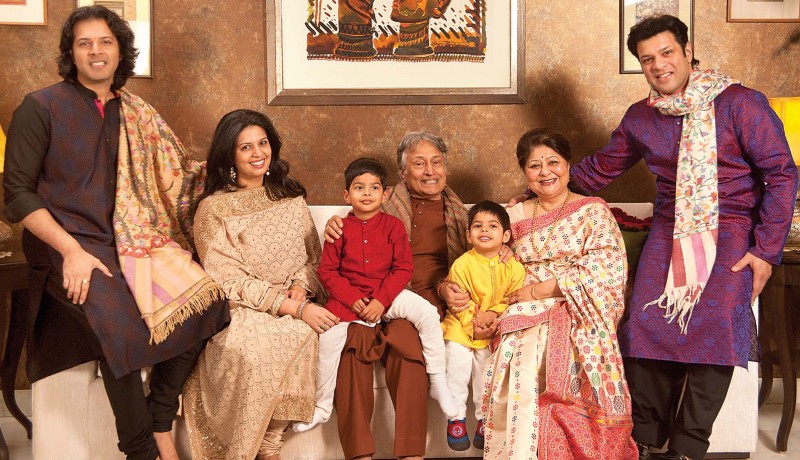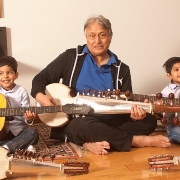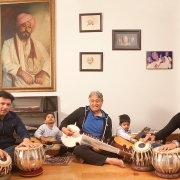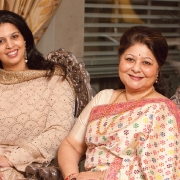
People

Even as they blaze new trails with the Sarod, Ustad Amjad Ali Khan and his family continue to be guided by the importance of tradition and the power of love, discovers Arati Rajan Menon
It is a beautiful, tastefully appointed house, like many in south Delhi. However, amid the minutiae of life and the requisite banter, there is a deeper purpose here—you sense it almost immediately. This is the home of Ustad Amjad Ali Khan, Padma Vibhushan. And life here is almost symphonic in nature; myriad chords, voices both strident and mellow, climbs, dips and runs, all melding into a resonant, uplifting composition that begins and culminates in a simple word: love.
“Mohabbat ibadat hai,” says the 69 year-old sarod maestro. Love is a prayer. “And it is the purpose of life.” There is a catch in his voice when he adds, “Unfortunately, human beings world over have not understood this. Despite the teachings of so many prophets from different faiths, we are still killing each other on account of religion. It has made people insecure, confining us to our homes, our cocoons. We talk so much about education but it has not been able to create kindness in humans. I can’t understand how a PhD becomes radical or communal. So what’s the contribution of education? We need more compassion in this world. Our country is known most for its diversity and interdependence between faiths and people. We need to spread the message of love.”
Love is the mantra
For his family, it’s more than a message—it’s a mantra. “Technical prowess apart, my father has always taught us that once people start loving you, everything falls into place,” says 36 year-old Ayaan, his younger son. “Of course, you have to deliver as a musician, but the battle of life is all about love. And music follows from love. That’s the teaching of the family.”
As if on cue, his mother Subhalakshmi joins us, wishing us a happy Bihu. It is an auspicious day, variously celebrated as Bihu, Pongal and Sankranti. “Today is a special day on the calendar but every day should be a day of love and celebration,” she asserts. “When you generate love, you get love back. That is the life we believe in.” An Indian classical dancer from Assam who trained in Kalakshetra under the tutelage of the legendary Rukmini Devi Arundale, she was happy to “take the backstage” after marriage. And it was not a sacrifice, she insists. “Dance was my passion,” she says. “But I realised that Khan sahib has much more to give the world; he is a greater artist. Just as his music moved me, it has the power to move so many people. I see the love of people, young and old, for him. That’s what he has truly gained in his journey.”
It has been a momentous one. Along the way, this 6th generation torchbearer of the Bangash lineage, rooted in the Senia gharana under the tutelage of his father Ustad Hafeez Ali Khan, has expanded the vocabulary of the sarod and reinvented its technique, taking it to an entirely new dimension and introducing it to the world. Following in his footsteps, sons Amaan, 38, and Ayaan started performing early and, over the years, have come into their own as sarod players and innovators. Now, the trio play and tour together, and individually, across the world; recent highlights include the Nobel Peace Prize Concert in Oslo in December 2014 and the Dalai Lama’s 80th birthday celebrations in New Delhi last month.
The Ustad gives the credit for their artistic development to his wife. “More than me, she has been their guru. I think mother is the first guru of every child. Still, our society and the world have not given women the respect they are due.”
This mother clearly realised the responsibility that came with such an artistic legacy. “It is always at the back of your mind that, as a mother, you should ensure the 7th generation continues,” she confesses. “It’s all about the ambience in which they grew up. Life is like water; it takes the shape of the vessel in which you keep it.” Amaan, is quick to highlight their mother’s role in their father’s career, too. “Ma was a true companion to Abba,” he says. “Being from the arts, she played a pivotal role in nurturing him into a musician.” As for their career, Ayaan calls his mother’s contribution “unparalleled”.
Early learnings
For his part, the proud father says, “There is no book that tells you how to present Indian classical music; no rigid rules on how to play sarod. Only God would know the ‘right way’ to play sarod or sing or perform on stage. We are just mortals. By His grace, I found Amaan and Ayaan connected with music right from their childhood. They have their own distinct character; you know who’s playing when you listen. They are different human beings and their approach to music is different; while Amaan is very adventurous, Ayaan is more introspective. I am just grateful that people have accepted both of them.”
Meanwhile, both sons are keenly aware that such a legacy is not a mantle to slip on with nonchalance. “Being from a certain family can bring you recognition but it is important to work hard,” points out Amaan. “You get something from the past but you have to take it forward. We started playing at an early age when we were unaware of what we were doing. It was only after a certain stage that the seriousness of our responsibility set in. The day you become responsible and know what the world expects from you is when you are born as a musician.”
The process, as they would be the first to admit, has been far from seamless—there has been doubt, introspection and struggle along the way. “At some level, music was looked at more as a way of life than a profession; no one asked us if we’d like to become musicians; it was just understood,” shares Ayaan. “Having said that, Amaan bhai was more questioning, and he would often ask Abba if this was the right path for him. Abba would tell him, ‘I don’t know. But you are blessed to have a gift and if you work in that direction, perhaps you will see light some day.’ That was my concern too, because our father has taken sarod to great heights; it’s a real challenge to see a life for sarod beyond what he’s done. But by God’s grace, as Ramakrishna Paramhansa said, ‘Joto mot, toto poth’ [As there are a number of beliefs, there are a number of ways].”
“As they say in relationships also, if you haven’t seen them all, you don’t know who the real one is,” says Amaan. “I tried my hand at a lot of things and finally realised this is what I was born to do. This is the only profession that embraces me with love and accepts me with all my bads.” Ayaan adds, “There’s always some kind of universal interference; whenever we’ve tried to do any project that deviated from music, it never worked out!” His elder brother is quick to agree. “It’s like there is a plan; and the moment you try and walk away from it, everything starts going wrong,” he says. “So it’s basically a give and take with the universe; the moment you start doing what you are supposed to, it starts rewarding you. If you’re focusing with a very pure heart, it comes back to you. When you get a gift, you have to respect it. We have learnt to put the sarod before ourselves.”
Both the boys remember—all too painfully—a concert in London over 25 years ago when they were less than respectful to their craft. “We were out of synch and it was a bad show,” reveals Amaan. “Abba was so upset that it affected him on a physical level. He actually got fever. He never scolded us; that was never his way. He just reminded us that we had to be serious with whatever we did in life. I don’t ever want to see a day like that again.”
New directions
With their doubts evidently behind them, Amaan and Ayaan have gone on to make the sarod a crossover instrument. But they dismiss any talk of creating ‘a style of their own’. “It’s a realisation others have that you are different; you cannot say it yourself,” reasons Amaan. “It’s like calling yourself ‘Ustad’ or ‘Pandit’. When you are born to a man like Ustad Amjad Ali Khan sahib, you cannot be bigger than that. The bigger concern is that you should not be the reason for his embarrassment. The first thing is to embrace and play everything he has played. First, read the book he’s written and then write a book of your own.”
Ayaan couldn’t agree more. “You walk in the direction shown by the guru; on the road, you may find many new avenues and tributaries. We have done thematic albums, electronic albums with the sarod; things that haven’t been done with the instrument. It is something we constantly learn from Abba. Despite being an artist of his calibre, he is open to anything new.” To this Amaan adds, “What Abba has done for the sarod is unparalleled; now, we are trying to get the instrument into newer sections. In fact, we are making our own father do new things. For instance, Ayaan bhai got Abba to shoot a video playing Jingle bells for Christmas; it went viral. On his own, he would have never done this! You see, the only thing constant in this world is change and movement. If you don’t change, you become obsolete. My grandfather never recorded albums and CDs because he thought they would play at weddings or a paan shop. He thought it would be disrespectful to the instrument. But he paid the price for that. He could not reach the masses. When you limit yourself from doing things, you also limit people’s access to you. So my father broke that barrier and we are following suit.”
Yesterday, today and tomorrow
Today, the arrival of twins Zohaan and Abeer, born to Ayaan and his wife Neema three-and-a-half years ago, has made the flame of music—and love—burn even brighter in the home. “Genes do matter; they do speak,” says their doting grandfather. “I have often seen the soul of my forefathers in Amaan and Ayaan; now, I see it in my grandchildren.” And music is inevitably woven into their life’s fabric.
“Music already has a magical effect on them,” says Ayaan. “It has happened in the most natural way,” adds Neema, who has blended harmoniously into the family since she married Ayaan eight years ago. Coming from a film family in Mumbai “who shares similar values about keeping the family together”, she understands her husband’s need for creative space and insists legacy and love go hand in hand. “Zohaan and Abeer spend quality time each day in the music room with Abba; it’s their favourite time of day—and his,” she says. “He has taught them to play the sargam on their sarods.” The family’s music room, large and sparse, is evidently a comfort zone for the tots; they are effortless with the instruments, flitting from the sarod—they have customised mini instruments already—to the guitar (dragged in from the library nearby), and take their seats behind the tablas with an ease born of familiarity. “In fact, if you give them a football, they start playing on it like a tabla!” adds Neema with a chuckle.
“Today, my father will never say that he wants the grand-kids to play the sarod,” says Amaan. “But heart of heart, it is our duty to offer everything to these boys and leave it to God’s will.” “This is our greatest wealth,” agrees Ayaan. “But they are free to do what they wish. Rather than worrying about the future, which I tend to do, we should celebrate what we have. Neema constantly reminds me that we have so much to be grateful for.”
The big picture is also on Amaan’s mind when he says, “Right now, we are sitting and talking. But there are 93 million movements happening around us. That’s how insignificant we are. You can become arrogant as a musician but if you pull even one nerve in your hand, it’ll all be over. We must live in gratitude. And we must live in each day, for each day. The only truth is you, standing here right now. Every other thing is fleeting.” Here, Ayaan takes us back to where we began: love. “The source of every truth is love,” he says. “This and the 12 notes of music are our reality. They are life.” Indeed.
Photos: Himanshu Kumar Featured in Harmony — Celebrate Age Magazine February 2016
you may also like to read
-
For the love of Sanskrit
During her 60s, if you had told Sushila A that she would be securing a doctorate in Sanskrit in the….
-
Style sensation
Meet Instagram star Moon Lin Cocking a snook at ageism, this nonagenarian Taiwanese woman is slaying street fashion like….
-
Beauty and her beast
Meet Instagram star Linda Rodin Most beauty and style influencers on Instagram hope to launch their beauty line someday…..
-
Cooking up a storm!
Meet Instagram star Shanthi Ramachandran In today’s web-fuelled world, you can now get recipes for your favourite dishes at….










